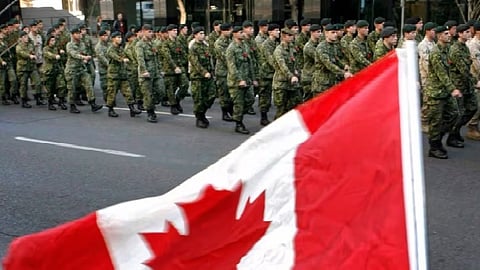

Cabinet must resort to an obscure law to pay the Canadian Armed Forces and RCMP, run the prisons and keep passenger trains running during the election campaign.
All budgeted funds voted by Parliament expire a week from Monday at midnight, says Blacklock’s Reporter.
“Departments can either make due with funds already approved or request special warrants,” said Martin Potvin, spokesperson for the Treasury Board.
“Payments urgently required” will be covered by special warrants under the Financial Administration Act.
Cabinet is permitted to authorize emergency spending “for the public good” though Parliament is dissolved and no budget can be passed.
“For a special warrant to be issued a minister must report an expenditure is urgently required for the public good and the President of the Treasury Board must report there is no funding available through current appropriations to make the payment,” according to a 2011 report to Parliament Special Warrants.
“Any initiative that is to be considered for funding through a special warrant must have the appropriate cabinet and Treasury Board approval.”
Use of warrants is rare but not unprecedented. Then-Prime Minister Stephen Harper’s cabinet issued warrants covering 9% of its annual budget after losing a 2011 non-confidence vote in the Commons.
The government was toppled Friday, March 25, 2011.
“This is a historic day,” then-Liberal Leader Michael Ignatieff said at the time.
“Enough is enough,” he told the Commons.
The non-confidence vote forced an immediate election less than a week before the end of the budget year with no time to introduce a money bill. Harper’s cabinet subsequently used 10 weeks’ worth of special warrants to cover $24.5 billion in emergency expenses.
The “urgently required” spending included $762 million to maintain the infantry, $703 million for the RCMP, $358 million to run federal prisons, $211 million to conduct that year’s census, $153 million to maintain VIA Rail passenger train service, $146 million for airport security screening, $135 million to process that year’s tax returns, $64 million for meat inspection, $45 million for weather forecasting and $20 million to keep doors open at federal courts.
The 2011 election saw Liberals lose 34 seats and become a third party in the Commons, their worst-ever defeat. Leader Ignatieff resigned after losing his own riding in Etobicoke-Lakeshore, Ont.
“People who think they’re entitled to standing because they are brainy, rich or famous almost always lose,” Ignatieff wrote in a 2014 New Republic essay.
He described his own career in Parliament as “nasty, brutish and short.”
